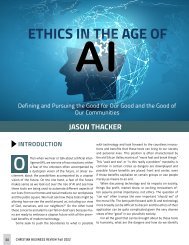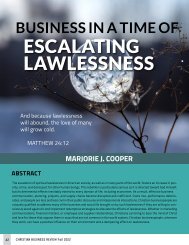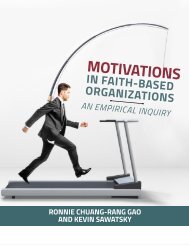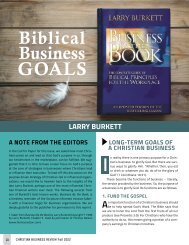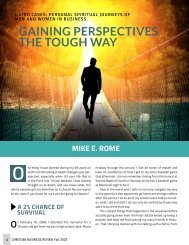Christian Business Review 2018: Kingdom Business in the Brave New World (Issue 7)
You also want an ePaper? Increase the reach of your titles
YUMPU automatically turns print PDFs into web optimized ePapers that Google loves.
WISDOM<br />
CBR PEER REVIEWED ARTICLES<br />
AS AMBASSADORS OF CHRIST, CHRISTIAN BUSINESS-<br />
PEOPLE SHOULD APPROACH TECHNOLOGY AS A<br />
MEANS OF DISSEMINATING GOD’S REDEEMING CARE<br />
TO ALL CREATION, RATHER THAN APPROACHING<br />
TECHNOLOGY AS A MEANS FOR REALIZING SELFISH<br />
AMBITIONS.<br />
<strong>Christian</strong>s who faithfully dwell on <strong>the</strong> revelation of God<br />
<strong>in</strong> Scripture can br<strong>in</strong>g unique <strong>in</strong>sights to <strong>the</strong> creation and<br />
disposition of technologies that impact <strong>the</strong> social order.<br />
Some Theological Frameworks for Wisdom<br />
It often appears that <strong>Christian</strong>s are no better at mak<strong>in</strong>g<br />
good decisions than non-believers. This is probably because<br />
<strong>Christian</strong>s can become so immersed <strong>in</strong> <strong>the</strong>ir culture<br />
that <strong>the</strong>y naturally follow <strong>the</strong> wisdom of <strong>the</strong> culture ra<strong>the</strong>r<br />
than <strong>the</strong> wisdom of God—that is, unless <strong>the</strong>ir m<strong>in</strong>ds have<br />
been discipl<strong>in</strong>ed to th<strong>in</strong>k <strong>the</strong>ologically ra<strong>the</strong>r than react<br />
accord<strong>in</strong>g to cultural expectations and/or <strong>the</strong>ir fallen dispositions.<br />
Psalm 1 says of <strong>the</strong> committed follower of Yahweh<br />
that “his delight is <strong>in</strong> <strong>the</strong> law of <strong>the</strong> Lord, and <strong>in</strong> his<br />
law he meditates day and night” (v. 2), <strong>in</strong>dicat<strong>in</strong>g habitual<br />
reflection on <strong>the</strong> Scriptures and what can be known of<br />
God, his creation, and <strong>the</strong> world system <strong>in</strong> which humans<br />
<strong>in</strong>teract.<br />
There are some consistent <strong>the</strong>ological constructs<br />
repeated over and over <strong>in</strong> <strong>the</strong> Scriptures that have widespread<br />
application and that should <strong>in</strong>form discussions of<br />
ethical dilemmas that arise from technological <strong>in</strong>novation.<br />
For example, a <strong>the</strong>ologically balanced understand<strong>in</strong>g of<br />
<strong>the</strong> character of God is critical. People often view God as so<br />
lov<strong>in</strong>g that anyth<strong>in</strong>g goes provided one is s<strong>in</strong>cere <strong>in</strong> one’s<br />
beliefs—thus, justice is overwhelmed. One implication of<br />
this misperception would be that any sort of technological<br />
program to which one sets oneself is perfectly acceptable<br />
if one is s<strong>in</strong>cere and blameless <strong>in</strong> <strong>the</strong> imag<strong>in</strong>ed applications.<br />
The idea that a technological application might violate<br />
God’s justice is foreign.<br />
Because God is <strong>the</strong> Creator and human be<strong>in</strong>gs are made<br />
<strong>in</strong> his image, it is not only understandable but arguably<br />
necessary that <strong>the</strong>y too are driven to discover and create<br />
with<strong>in</strong> <strong>the</strong> scope of <strong>the</strong>ir ability. However, this fact challenges<br />
<strong>the</strong> frequent practice of <strong>in</strong>novation divorced from<br />
moral ground<strong>in</strong>gs, because God and his standards should<br />
be an <strong>in</strong>tegral part of <strong>the</strong> <strong>in</strong>novation process—that is, all<br />
<strong>in</strong>novation <strong>in</strong>herently should have a moral awareness<br />
guid<strong>in</strong>g its development. Builders of <strong>the</strong> Tower of Babel<br />
undoubtedly viewed <strong>the</strong>mselves as <strong>in</strong>novators of new<br />
technology; unfortunately, <strong>the</strong>ir motives were revealed as<br />
self-serv<strong>in</strong>g and anti-god (Gen. 11:1-9). If <strong>the</strong>y had considered<br />
carefully God’s perspective on <strong>the</strong>ir endeavor, <strong>the</strong>y<br />
could have avoided his judgment.<br />
For such reasons, each stage from idea generation to<br />
implementation necessarily should <strong>in</strong>clude <strong>the</strong> “what<br />
ifs” that govern possible misuse of <strong>the</strong> <strong>in</strong>novation and/or<br />
un<strong>in</strong>tended consequences that might arise. Unfortunately,<br />
it seems to be human nature to become so enamored of<br />
an <strong>in</strong>novative idea that thoughts of negative outcomes are<br />
quickly brushed aside <strong>in</strong> <strong>the</strong> enthusiasm to “sell” o<strong>the</strong>rs<br />
on <strong>the</strong> idea. Ego and personal aggrandizement take over;<br />
moral foot<strong>in</strong>g is lost <strong>in</strong> <strong>the</strong> excitement. O<strong>the</strong>r reasons for<br />
moral lapses may <strong>in</strong>clude ignorance of possible outcomes<br />
from <strong>the</strong> technology; lack of facility <strong>in</strong> moral reason<strong>in</strong>g;<br />
self-serv<strong>in</strong>g motives for push<strong>in</strong>g <strong>the</strong> technology forward;<br />
or a utilitarian belief that one is serv<strong>in</strong>g <strong>the</strong> “greater<br />
good.”<br />
Human be<strong>in</strong>gs are creative because <strong>the</strong>y are made <strong>in</strong><br />
<strong>the</strong> image of God (Gen. 1:26-27). Not only were human be<strong>in</strong>gs<br />
made to reflect <strong>the</strong> creativity of God through <strong>in</strong>novation,<br />
but <strong>the</strong>y were also <strong>in</strong>tended to carry out <strong>the</strong> redemptive<br />
purposes of God throughout <strong>the</strong> earth (2 Cor. 5:20). As<br />
ambassadors of Christ, <strong>Christian</strong> bus<strong>in</strong>esspeople should<br />
approach technology as a means of dissem<strong>in</strong>at<strong>in</strong>g God’s<br />
redeem<strong>in</strong>g care to all creation, ra<strong>the</strong>r than approach<strong>in</strong>g<br />
technology as a means for realiz<strong>in</strong>g selfish ambitions.<br />
This leads us to ano<strong>the</strong>r fact of wisdom—not a pleasant<br />
one but a necessary one—that human be<strong>in</strong>gs are<br />
fallen. In fact, <strong>the</strong> Bible teaches that, as a race, humans are<br />
evil. Ecclesiastes 9:3 tells us that “<strong>the</strong> hearts of <strong>the</strong> sons of<br />
men are full of evil and <strong>in</strong>sanity is <strong>in</strong> <strong>the</strong>ir hearts throughout<br />
<strong>the</strong>ir lives.” Ra<strong>the</strong>r than expect<strong>in</strong>g that humans will<br />
make good, moral choices, we should expect that if <strong>the</strong>re<br />
is some way to turn a good technology <strong>in</strong>to an <strong>in</strong>strument<br />
of destruction, humans will f<strong>in</strong>d a way to do it. Such a<br />
perspective could be construed as negative th<strong>in</strong>k<strong>in</strong>g, but<br />
<strong>the</strong> <strong>Christian</strong> ought to understand that anticipation is <strong>the</strong><br />
first step toward prevention of abuse. Fur<strong>the</strong>rmore, <strong>Christian</strong>s<br />
should be <strong>the</strong> most realistic of all people, because<br />
<strong>the</strong>y should recognize <strong>the</strong> repetition of human failure<br />
and disobedience del<strong>in</strong>eated <strong>in</strong> Scripture. When negative<br />
consequences are anticipated <strong>in</strong> advance, moral guardrails<br />
and dis<strong>in</strong>centives for technology abuse can be put <strong>in</strong><br />
place. Honest and open bra<strong>in</strong>storm<strong>in</strong>g about <strong>the</strong> possible<br />
misuse of technological <strong>in</strong>novation enables managers to<br />
CHRISTIAN BUSINESS REVIEW fall <strong>2018</strong> 25




